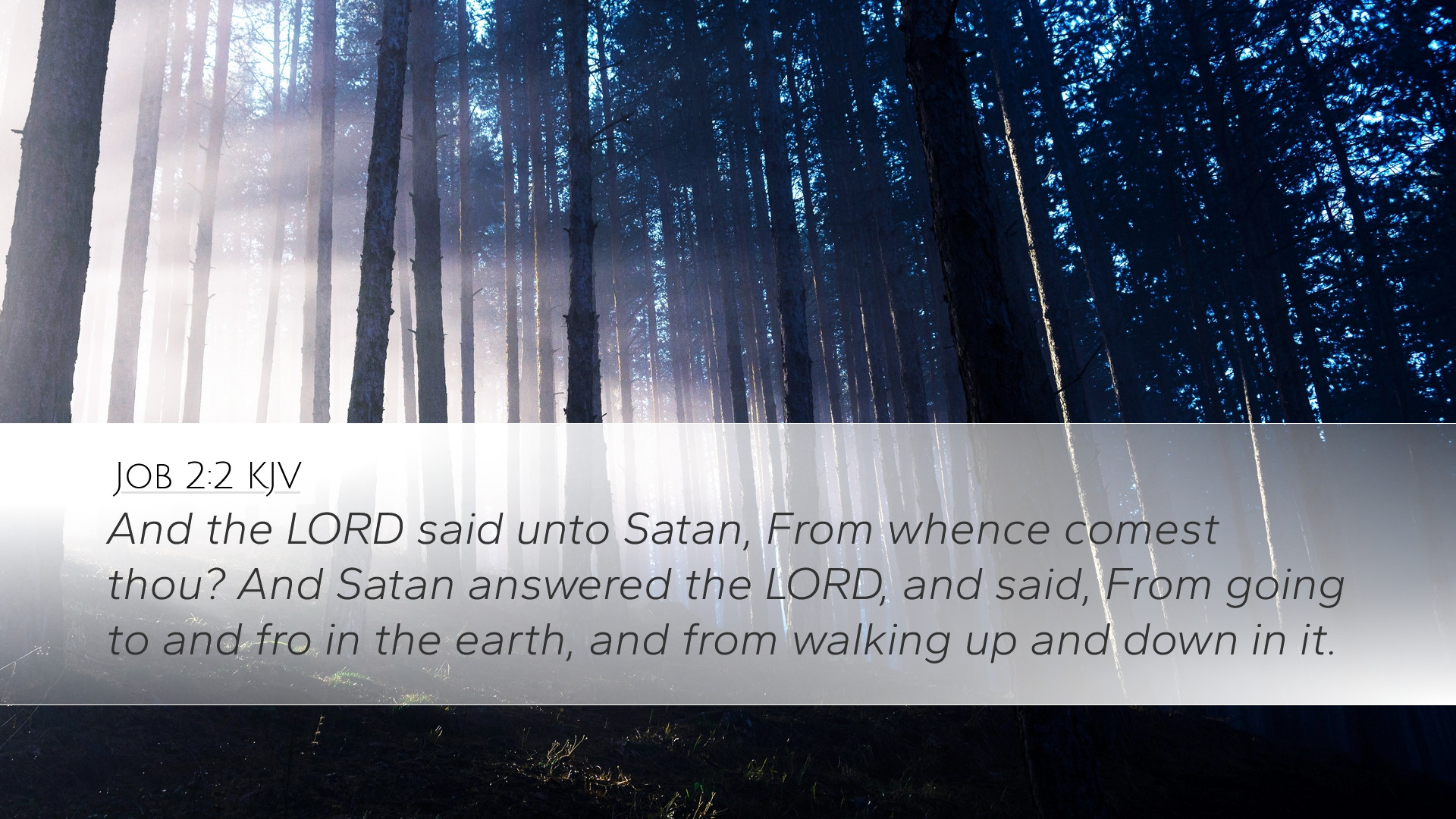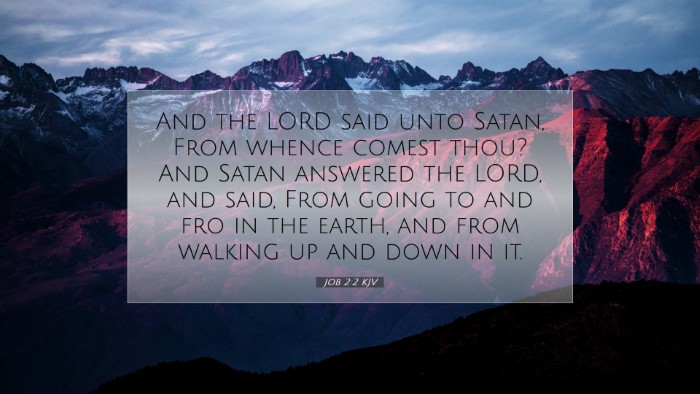Old Testament
Genesis Exodus Leviticus Numbers Deuteronomy Joshua Judges Ruth 1 Samuel 2 Samuel 1 Kings 2 Kings 1 Chronicles 2 Chronicles Ezra Nehemiah Esther Job Psalms Proverbs Ecclesiastes Song of Solomon Isaiah Jeremiah Lamentations Ezekiel Daniel Hosea Joel Amos Obadiah Jonah Micah Nahum Habakkuk Zephaniah Haggai Zechariah MalachiJob 2:2
Job 2:2 KJV
And the LORD said unto Satan, From whence comest thou? And Satan answered the LORD, and said, From going to and fro in the earth, and from walking up and down in it.
Job 2:2 Bible Commentary
Commentary on Job 2:2
Verse: "And the Lord said unto Satan, From whence comest thou? And Satan answered the Lord, and said, From going to and fro in the earth, and from walking up and down in it."
Introduction
This verse is foundational in understanding the ongoing dialogue between God and Satan regarding humanity, specifically the character of Job. It unfolds in the context of Job's immense suffering and the cosmic struggle that is central to the Book of Job. Commentary on this verse from notable theologians offers a rich tapestry of insights.
Insights from Matthew Henry
Divine Inquiry: Matthew Henry emphasizes the significance of God's question to Satan regarding his whereabouts. The inquiry “From whence comest thou?” suggests God's sovereignty, as He is undeterred by the presence of evil. He already knows all things, yet He engages in this questioning to reveal the motives and intentions of Satan.
Nature of Satan’s Activity: Henry further elaborates that Satan's response indicates his ceaseless activity in the world. His going "to and fro" speaks to a thorough and relentless pursuit of the downfall of humanity. This depiction serves as a reminder of the constant vigilance required in a believer's life.
Insights from Albert Barnes
Theological Implications: Albert Barnes draws attention to the implications of Satan's roaming. He posits that this behavior underscores a spiritual warfare that is not confined to the heavenly realms but extends to earth where humans reside. Barnes argues that this presents an ongoing challenge for humankind, where faith is tested amidst spiritual opposition.
Understanding God's Sovereignty: According to Barnes, God's question is not for His own understanding but rather to teach mankind about accountability and the reality of evil's presence in the world. While God allows Satan a measure of freedom, it serves the greater purpose of testing and refining human character.
Insights from Adam Clarke
Satan’s Role and Limitations: Adam Clarke provides a view on Satan's activities. He notes that while Satan is described as roaming the earth, he operates under divine permission. Clarke emphasizes that this shows God’s control over even the forces of evil, signifying that although evil may roam, it is ultimately God who is sovereign over all creation.
Nature of Human Trials: Clarke also points out that this verse reveals God’s allowance for trials in the lives of believers. It serves as an important theological anchor: trials are permitted, often for the purpose of drawing believers closer to God and strengthening their faith, despite the intentions of the adversary.
The Nature of Evil in Context
The dialogue in Job 2:2 encapsulates the broader theme of the Book of Job, which grapples with the problem of evil and suffering. The fact that Satan's activity is acknowledged and questioned by God emphasizes that while evil exists, it is not beyond divine governance.
Applications for Believers
- Awareness of Spiritual Warfare: Believers are called to be cognizant of the ongoing spiritual battle, recognizing that they are not merely passive recipients of life's circumstances, but active participants in a cosmic struggle for faith and fidelity.
- Endurance in Trials: Just as Job endured suffering, Christians can find encouragement to persevere in their trials, understanding that these tests hold the potential for growth and a deeper relationship with God.
- Divine Sovereignty: The assurance that God is sovereign, even over adversarial actions, provides comfort to believers. This foundational truth allows them to face difficulties with faith, knowing God has a purpose and a plan.
Conclusion
Job 2:2 serves as a poignant reminder of the nature of God, the reality of evil, and the call to endurance among believers. Through the insightful contributions of Matthew Henry, Albert Barnes, and Adam Clarke, readers are equipped with a deeper understanding of the interplay between divine sovereignty and the presence of suffering, ultimately leading to a stronger faith. This verse beckons every believer to remain steadfast and vigilant in the face of challenges while trusting in God's overarching purpose.


